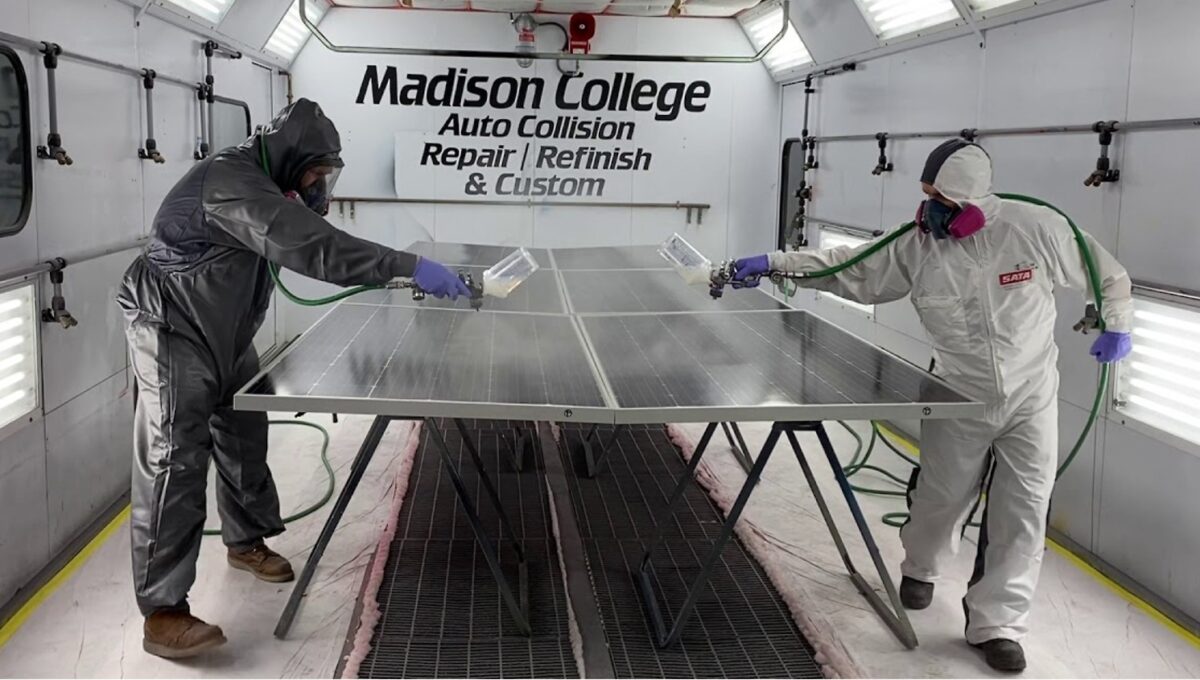From pv magazine Global
Scientists from the Madison Area Technical College in the Wisconsin have tested superhydrophobic self-cleaning, anti-soiling coatings that, if applied to photovoltaic modules, can purportedly increase the panels’ yield by over 3%.
The coatings are based on nanoparticle oxide suspensions developed by US-based Microporous Oxides Science and Technology, LLC (MOST), which specialises in the preparation of stable suspensions of nanoparticulate oxides for use as coatings on several substrates to produce self-assembled porous thin-films for a wide variety of applications.
The researchers tested, in particular, anti-soiling coatings created via spray deposition and sol-gel synthesis, a wet-chemical technique commonly utilised for the production of both glassy and ceramic materials. The coatings were made with a nanoparticulate suspension containing a mixture of titania, titanium oxide (TiO2), silica, silicon dioxide (SiO2) and metal oxides.
The advantage of using sol-gel synthesis is not using heat to make the coating adhere to the underlying glass cover of the PV module, which allows the films to consolidate, cure, bond, and harden upon exposure to sunlight in the field.
“Metal oxide thin films containing nanoparticulate photoactive materials such as titania are capable of sintering upon excitation from ultraviolet radiation,” the scientists explained. “This sunlight-induced UV sintering process serves to chemically bond the nanoparticles to one another, and to the solar PV module’s glazing surface, rendering a durable thin film that is resistant to wear and dissolution.”
The research team coated the solar modules in an automotive collision repair spray booth with two different spray guns and nozzles. “After spraying, the modules were allowed to air dry in the spray booths, which were maintained at 15% relative humidity,” the scientists explained.
They then tested the coating on a PV system relying on eight 370 W south-oriented coated bifacial modules mounted with a tile angle of 10 degrees provided by Jordan-based Philadelphia Solar. Their performance was compared with that of eight uncoated reference panels of the same kind.
The field tests showed that soiling residues on the coated modules were thinner than those in the uncoated panels.
“Coated and uncoated solar modules also demonstrated significantly different wetting behaviour in the field that was easily visible to the naked eye,” the research group said in the report. “Rain deposited on the uncoated panels tended to bead up, forming raised droplets on the surface. By comparison, rain on the coated panels tended to sheet, wetting a much larger portion of the panel’s surface.”
The analysis showed that the coated panels achieved an annual power production of 1,097 kWh/kW, while the uncoated modules achieved a yield of 1,058 kWh/kW. “While a 3 to 3.5% energy gain may appear modest, improvements of this magnitude would be of significant financial importance to the industry,” the researchers said.
They also specified that the cost of thin film coating materials is approximately $80 per liter and estimated the cost per panel at about $2.6, which would represent an increase of about 1.4% in the total cost of the panel. “It appears clear that the MOST coatings tested in this study have strong potential to be a commercially viable product for solar manufacturing.”
The novel anti-soiling coating was presented in the study “Field tests of a self-sintering, anti-soiling, self-cleaning, nanoporous metal oxide, transparent thin film coating for solar photovoltaic modules,” published in Solar Energy Materials and Solar Cells.
“As of August 2023, we have successfully coated modules from several different manufacturers, including Adani, Axitec, Crossroads, REC, Silfab, Trina and Yingli,” the scientists said referring to the future direction of their work. “We hope to report on field tests using those coated modules in the next year or two.”
This content is protected by copyright and may not be reused. If you want to cooperate with us and would like to reuse some of our content, please contact: editors@pv-magazine.com.









By submitting this form you agree to pv magazine using your data for the purposes of publishing your comment.
Your personal data will only be disclosed or otherwise transmitted to third parties for the purposes of spam filtering or if this is necessary for technical maintenance of the website. Any other transfer to third parties will not take place unless this is justified on the basis of applicable data protection regulations or if pv magazine is legally obliged to do so.
You may revoke this consent at any time with effect for the future, in which case your personal data will be deleted immediately. Otherwise, your data will be deleted if pv magazine has processed your request or the purpose of data storage is fulfilled.
Further information on data privacy can be found in our Data Protection Policy.